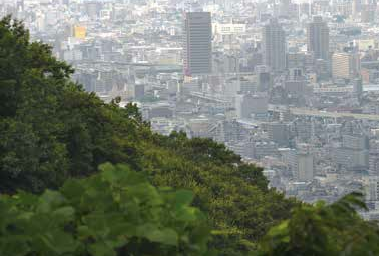Issue:
Eric Johnston finds in Kansai a wealth of diversity, a unique view of social trends and an attractive cost of living
YEARS, FRIENDS IN AND OUT OF JAPAN have repeatedly asked me why I’m not working in the nation’s capital. They are, to put it mildly, surprised a foreign journalist would willingly live and work in the Kansai region rather than in Tokyo.
I’ve never been seriously tempted to make the move, partially because (1) I work for the Japan Times, which, thankfully, wants news from this part of the country and understands the importance of a Kansai viewpoint on national and international issues; and (2) there are practical and logistical issues that make it easier to be based here than in Tokyo.
Let’s start with the bottom line. One can find office space in my neighborhood of Osaka, an area with quiet parks, cafes, shops, and craft beer restaurants, yet just a 15-minute walk to Osaka’s main Umeda area, for as little as ¥20,000 a month. The cost of living in one of Kansai’s four main cities (Osaka, Kyoto, Nara or Kobe) is, in general, about 15 to 20 percent less than Tokyo. And you get more bigger offices, apartments and houses. In these days of cost-cutting measures, especially for overseas reporting, Kansai is, compared to Tokyo, a bargain.
The second reason is geography. From Osaka, Kyoto is 30 minutes and Kobe is 20 minutes away on the fastest trains. By train, Nara is about an hour and Hiroshima is roughly 90 minutes, while Tokyo is an hour by air. There are three major airports (Kansai, Itami and Kobe) to choose from. If you need to get to western Japan or East Asia on assignment, it’s easy and, if you know where to look, cheaper in the case of Okinawa flights, for example, up to 50 percent cheaper than flying out of Haneda or Narita.
Other professional advantages are less quantifiable and depend greatly on what kind of a journalist you are. If you have to attend lots of official government press conferences, then the Kansai region is definitely not the place to be. But if you have the freedom to do more feature-type pieces, analysis and commentary, and if much of your work is being done over the phone or the computer anyway, then you, and your editors or producers, need to seriously ask if it’s absolutely necessary to be in Tokyo.
If your beat is Japanese culture, you can do worse than Kyoto. If your beat is business, and you write on small and medium-sized Japanese firms, you already know of Osaka’s importance. And if you only need to be in Tokyo semi-regularly, then you have to weigh the cost of travel X times a month between Tokyo and less-expensive Kansai against the cost of being based in more expensive Tokyo. You may find that, even with the added costs of flights, shinkansen tickets, and hotels, you’re still saving money by being based in Kansai.

As general correspondent, though, Kansai is a great place for its great diversity. Osaka, Kyoto, Kobe or Nara have distinct personalities, petty rivalries, special quirks, and different outlooks on just about everything. Certainly, in terms of living environment, it’s hard to beat Kansai. If you want a beachfront view, check out west of Kobe, only about 45 minutes to an hour from central Osaka. If you’re a mountain man (or woman), the rural hills of Kansai beckon, but are often only a short train ride (15 to 20 minutes in some cases) to an urban center. How about a Mediterranean climate? Parts of Kansai, especially the coastal areas, are warm most of the year. Prefer the four seasons? Northern Kyoto and Hyogo are the place to be.
I REMAIN CONVINCED KANSAI IS A GREAT PLACE IF YOU WANT TO KEEP EYE ON NOT ONLY THE NEWS-OF-THE-DAY BUT OBSERVE DEEPER TRENDS
And what of the cities? Kansai is great for those whose motto is vive la différence! Osaka offers a modern, uber-urban atmosphere with hip restaurants, shops, and entertainment. Those seeking the more historical, refined, and cultured Japan head to Kyoto. Need to be near good international schools and hoping to live in an “international” atmosphere? Kobe is often named by Tokyoites as their favorite Kansai city, partially because, they say, it’s the Kansai city closest to Tokyo in terms of attitudes and atmosphere.
Of course, there are challenges. You do need an ability to speak and write Japanese well above what you can get by with in central Tokyo, and it takes more time to cultivate sources. And when news happens in eastern or northern Japan, you’re at a disadvantage. Flights to and from Tohoku are extremely expensive. Given the ongoing crisis at Fukushima, journos who need to be there or the devastated towns in Iwate and Miyagi prefectures on a regular basis should stay in Tokyo.
In the end, though, I remain convinced Kansai is a great place to be based if you want to keep eye on not only the news-of-the-day but observe deeper trends affecting the rest of the country (and thus national political and social trends). No, you don’t have the advantage of being on the front lines of reporting, counting and classifying each new tree that comes along. But the view of the forest that is Japanese society can be much better, even if it is often quite different from what all of the other tree surveyors in Tokyo are saying. Vive la différence, indeed.
Eric Johnston is the Kansai-based Deputy Editor of the Japan Times.

